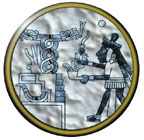

Within the indigenous Latin American community, it is believed that one's health is tied to the balance of energy in the individual, the community, and the universe at large. Ill health occurs when energy is out of balance, and it takes the efforts of the community to restore the patient's health. The healer comes from within the community and must have the trust of the community, the family, and the patient in order to succeed. Usually one family has been treating the community for generations, using methods handed down through the oral tradition. Mainstream physicians working in the region must consider the healer's practices, and blend herbal or botanical treatments with their mainstream treatments.
![]() Return
to the Menu Page
» NIH
Complementary/Traditional
Return
to the Menu Page
» NIH
Complementary/Traditional
Latin American rural medicine is based on folk healing developed from indigenous beliefs and behaviors specific to certain cultural groups and settings.
While "scientific" medicine is based on the theory of natural causation, many religious and ethnic populations link magical or supernatural intervention to the cause of an illness. Ailments are grouped by:
A Mexican blend of Spanish-Catholic and indigenous traditions, Curanderismo deals with the sources and treatments of social and personal ill-fortune, including bad health. Regional variations on this particular style of folk medicine are widely practiced by Latin Americans, sharing the following elements:
Manifestations are physical or psychological in nature - like headaches, gastrointestinal symptoms, fever and pain, depression, exhaustion, irritability or anxiety.
Treatment options range from herbal remedies and diet, massages and cleansings, prayer and chants to shamanic dramatury and symbolic visualization.
The healing ceremony involves the patient and the family at large, creating positive expectancies based on the practitioner's reputation and the community's support. The depth and intensity of the participants faith corresponds directly to the effective outcome and successful cure.
Espiritismo is the Puerto Rican synthesis of Spanish, African and indigenous Indian folk systems that combines ancient spiritual beliefs with quasi-religious healing techniques.
Based on a theory of visible and invisible worlds, journeying entities - sometimes in human form - pass through different stages of perfection toward their ultimate goal of unity with god. When they err from their path, due to desires of previous lives, they often cause trouble for people through dreams or actual possession manifested in psycho-somatic complaints, stress, anxieties and nervous conditions.
"Espiratistas" (mediums) are called upon for symptomatic relief, often complementing orthodox medicine, to improve mental health conditions and distressed relationships. Empowered to draw on their inner resources, patients are encouraged to change their thoughts and attitudes. During a "reunione" the medium, possessed by and communicating for the spirit, is consulted regarding the characteristics of a specific illness. To protect the participants from further anguish, the entity is then severely criticized and urged to assume their original mission.
Repeated as often as deemed necessary, the treatment is enhanced at home through prayer, herbs and magical charms.